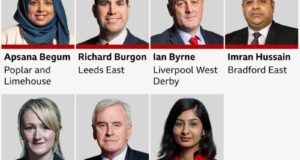Bangla Mirror Desk ::
Jeremy Corbyn’s plans to oppose the benefits cap have been undermined by members of his own shadow cabinet, as he prepares to face David Cameron in prime minister’s questions for the first time.
Speaking to the Trades Union Congress conference in Brighton on Tuesday, Corbyn said the benefits cap introduced by the coalition created “social cleansing” and that the party would oppose it all together.
But speaking hours later on the BBC’s Newsnight programme, the shadow work and pensions secretary, Owen Smith, said the party was only opposing government plans to reduce the cap.
The shadow equalities minister, Kate Green, speaking on BBC Radio 4’s Today programme on Wednesday, said the Labour party’s present policy position was to support the principle of the benefit cap and that there was some evidence it had helped people into work.
She argued that policy was created collectively by the party, implying that Corbyn could not change Labour’s position unilaterally.
In the last parliament, the coalition introduced a cap of £26,000 on the amount of state benefits a family can receive. The Conservative government has pledged to cut the cap to £23,000 in London and £20,000 outside London.
Speaking to the TUC conference in his first major speech as leader of the opposition, Corbyn said: “As I’m concerned the amendments we’re putting forward are to remove the whole idea of the benefit cap altogether. We’ll bring down the welfare bill in Britain by controlling rents and boosting wages, not by impoverishing families and the most vulnerable people.”
He added: “We oppose the benefit cap. We oppose social cleansing.”
Asked about Corbyn’s comments a few hours later, Smith told the BBC that Labour’s policy was “to oppose the welfare bill, which includes a reduction from £26,000 to £23,000 the benefit cap for individual households”, but added: “We are very clear that we are in favour of an overall reduction in the amount we spend on benefits and we are in favour of limits on what individual families can draw down because I don’t think the country would support us saying we are in favour of unfettered spending.”
On Wednesday morning, Green backed Smith’s comments, saying: “When Jeremy asked me to join the shadow cabinet on Sunday, I said to him that the way I approached difficult decisions like this is to look at the evidence. And what the evidence is showing us is that the cap has been a little bit successful in moving people who weren’t working and could work into work.”
“I don’t think it’s any secret that Jeremy and other London MPs in particular are against the cap because they’ve seen it having a particularly harsh effect in London, where housing costs are very high,” said Green.
“The present policy position of the party, decided collectively by the party – and that’s the way we make policy in the Labour party, Jeremy is very respectful of the collective approach – is that we accept the principle of the cap, but it is not currently before parliament to have a vote to remove it all together. Obviously if that becomes a possibility in parliament the party will decide collectively where we stand.”
Corbyn on Wednesday faced David Cameron in prime minister’s questions for the first time since he was elected leader of the opposition on Saturday.
In what may be seen as the first crowd-sourced session of PMQs, the new Labour leader asked Cameron questions on subjects chosen by supporters, after his campaign sent out an email asking for suggestions.
 Weekly Bangla Mirror | Bangla Mirror, Bangladeshi news in UK, bangla mirror news
Weekly Bangla Mirror | Bangla Mirror, Bangladeshi news in UK, bangla mirror news








